
For many, achieving healthy, lustrous hair can feel like an elusive dream. We navigate a sea of conflicting advice and endless product shelves, yearning for that coveted shine and bounce. But fret no more! Here, we unveil the wisdom of sought-after hair and scalp experts, offering their five best tips to transform your hair care routine.
1. Scalp Massage: The Foundation for Healthy Hair Growth
Trichologist Anabel Kingsley, renowned scalp care specialist, emphasizes the importance of scalp massages. She states, “Scalp massage can improve blood circulation, which can nourish the hair follicles and promote hair growth”. A 2022 study published in the Journal of Cosmetic Dermatology supports this claim. The study found that scalp massage increased hair thickness in participants after a 24-week period.
Real People’s Experiences
Adding a scalp massage to their routine has yielded positive results for many. Sarah Jones, a marketing professional, shares, “I started scalp massaging while shampooing about two months ago. My hair feels thicker and fuller, and it seems to be shedding less too!” Similarly, hairstylist Michael Angelo notes a surge in client interest in scalp care. “Many clients are asking about scalp massages and scalp scrubs. They’re realizing the scalp’s health is vital for beautiful hair.”
How to Massage Your Scalp:
- Apply a gentle pressure using your fingertips.
- Move your fingers in circular motions across your entire scalp.
- Start at your hairline and work your way towards the crown of your head.
- Aim for 5-10 minutes of massage during shampooing.
2. Condition Like a Pro
Celebrity hairstylist Chris Appleton highlights the importance of proper conditioning. “Conditioner is your hair’s best friend, especially for dry or damaged ends,” he says. However, conditioner application matters. Trichonutrient expert Shirley Wright advises, “Focus on applying conditioner to the mid-lengths and ends of your hair, avoiding the roots”. This prevents greasy buildup at the scalp while ensuring the driest parts of your hair receive the most moisture.
Conditioner Conundrum: Silicones and Alternatives
Silicones, a common ingredient in conditioners, can provide a temporary feeling of smoothness. However, some argue they can lead to buildup over time. Luckily, there are alternatives! Look for conditioners containing ingredients like shea butter, coconut oil, or argan oil for natural hydration.
3. Less is More: The Wisdom of Gentle Cleansing
Hairstylist and curl specialist Felicia Leatherwood emphasizes the importance of gentle cleansing. “Frequent shampooing can strip your hair of its natural oils,” she says. Dermatologist Dr. Francesca Fusco agrees, recommending shampooing only 2-3 times a week for most hair types. This allows your scalp to produce natural oils that keep your hair healthy and hydrated.
The Co-Washing Craze: A Viable Option?
For those with particularly dry hair, co-washing (using conditioner instead of shampoo) can be a gentle alternative. However, it’s not suitable for everyone. Trichologist Bridgette Hill recommends consulting a hair professional to determine if co-washing is right for your hair type.
4. Embrace the Power of Heat Protectants: Shielding Your Hair from Damage
Heat styling can be a blessing and a curse. Celebrity hairstylist Justine Marjan stresses the importance of heat protectants. “Heat protectant spray is a non-negotiable before using any hot tools,” she says. A 2019 study published in the International Journal of Trichology found that heat protectant sprays significantly reduced hair breakage caused by heat styling.
Heat Protectant Options
There are various heat protectant formulas available, from sprays and creams to serums. Look for products containing ingredients like silicones, polymers, and panthenol, which help shield hair from heat damage.
5. Diet and Lifestyle: Nourishing Your Hair from the Inside Out
Trichologist Philip Kingsley emphasizes the link between diet and hair health. “A balanced diet rich in essential vitamins and minerals is crucial for healthy hair growth,” he says. Biotin, iron, vitamin D, and omega-3 fatty acids are all important nutrients for hair health.
Taking Care of Yourself
Remember, stress can also impact hair health. Aim for adequate sleep, manage stress levels, and consider incorporating a daily multivitamin to ensure you’re getting the nutrients your hair needs to thrive.
